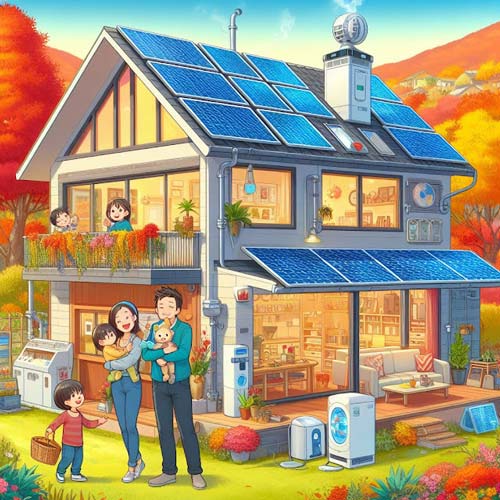Imagine a world where you can power your home with the sun’s rays, cook your meals with solar energy, and heat your water without relying on fossil fuels. This is the world of solar energy, a clean, renewable, and abundant source of power that is changing the way we live. In this article, we will explore some of the most innovative and exciting ways to use solar energy in your home, and how you can benefit from this incredible technology.
It needs to be confirmed that using solar energy for home is not as easy as lighting up the home and cooking pizza with common power gird but you can be the pioneer who does her/his commitment for the planet and opens the way for others.
Solar Electricity
One of the most common and popular ways to use solar energy for a home is to install photovoltaic (PV) panels on the roof or in the yard. These panels convert sunlight into direct current (DC) electricity, which can then be used to power appliances, lights, and other devices. Alternatively, the DC electricity can be converted into alternating current (AC) electricity using an inverter, and fed into the grid or stored in batteries for later use.
Some of the advantages of using solar electricity for home are:
– It can reduce or eliminate your electricity bills, depending on the size and efficiency of your system and your energy consumption.
– It can increase the value of your home, as solar panels are seen as a desirable feature by many buyers.
– It can reduce your carbon footprint, as solar electricity does not emit greenhouse gases or other pollutants.
– It can provide you with energy security and independence, as you do not have to rely on the grid or utility companies for your power supply.
Some of the challenges of using solar electricity for home are:
– It can be expensive to install and maintain, as solar panels, inverters, batteries, and other components require upfront and ongoing costs.
– It can be affected by weather and seasonal variations, as solar panels produce less electricity on cloudy or rainy days, and during winter months.
– It can require permits and approvals from local authorities, utility companies, and homeowners associations, as solar panels may have to comply with certain codes, standards, and regulations.
Solar Water Heating
Another way to use solar energy for the home is to heat water using solar collectors. These are devices that absorb the sun’s heat and transfer it to a fluid, usually water or antifreeze, that circulates through pipes. The heated fluid then flows to a storage tank, where it can be used for domestic hot water, space heating, or pool heating.
Some of the benefits of using solar water heating for the home are:
– It can save you money on your water heating bills, as solar water heaters can provide up to 80% of your hot water needs, depending on the size and type of your system and your water usage.
– It can extend the life of your conventional water heater, as solar water heaters can preheat the water before it enters the tank, reducing the workload and wear and tear of the heater.
– It can reduce your environmental impact, as solar water heating does not produce any emissions or waste.
Some of the drawbacks of using solar water heating for the home are:
– It can be costly to install and operate, as solar water heaters, pumps, controllers, and other components require initial and recurring expenses.
– It can be influenced by weather and location, as solar water heaters need adequate sunlight and roof space to function optimally.
– It can require backup systems and safety measures, as solar water heaters may not be able to meet all your hot water demands, especially during peak hours or cold days, and may need to be protected from freezing, overheating, or leaking.
Solar Cooking
A third way to use solar energy for home is to cook food using solar cookers. These are devices that use the sun’s rays to heat, bake, or boil food in pots, pans, or trays. There are different types of solar cookers, such as box cookers, parabolic cookers, and panel cookers, that vary in their design, performance, and portability.
Some of the advantages of using solar cooking for home are:
– It can save you money on your fuel bills, as solar cookers do not require any gas, electricity, or wood to cook food.
– It can improve your health and safety, as solar cookers do not produce any smoke, fumes, or fire hazards that can harm your lungs, eyes, or skin.
– It can enhance your food quality and taste, as solar cookers preserve the nutrients, moisture, and flavor of the food, and prevent burning or overcooking.
– And also it reduces carbon footprint.
Some of the disadvantages of using solar cooking for home are:
– It can be time-consuming and inconvenient, as solar cookers take longer to cook food than conventional methods, and require frequent adjustment and supervision to follow the sun’s movement.
– It can be limited by weather and season, as solar cookers need clear and sunny days to work effectively, and may not be suitable for winter or rainy climates.
– It can require special equipment and skills, as solar cookers need specific cookware, recipes, and techniques to ensure successful and delicious results.
Solar Lights
Solar lights are a type of lighting that uses the sun’s energy to power LED bulbs, which are more efficient and durable than traditional incandescent or fluorescent bulbs. Solar lights can be used for various purposes in and around the home, such as illuminating pathways, gardens, patios, or indoor spaces.
Some of the advantages of using solar lights for home are:
– Saving money on electricity bills
– Reducing environmental impact
– Enhancing the aesthetics and security of the home.
Some of the drawbacks of using solar lights for the home are:
– Requiring adequate sunlight exposure
– Having limited brightness and run time
– Needing regular maintenance and cleaning.
– Solar lights may not work well in cloudy or rainy weather, or in areas with high shade or pollution.
– Solar lights may also have lower quality or performance than wired lights, depending on the brand and model.
– Solar lights may need to be replaced or repaired more often than wired lights, as they are exposed to harsh weather conditions and physical damage.
Therefore, solar lights are not a perfect or easy solution, but they are a convenient and eco-friendly option for home lighting.
Conclusion Solar Energy for Home
Solar energy is a versatile and valuable resource that can be used for various purposes in our homes. From reducing your carbon footprint to increasing your energy independence, solar electricity offers a range of advantages that can improve your quality of life. However, it’s important to remember that using solar energy for your home sometimes is challenging. It requires careful planning, installation, and maintenance, and can be expensive upfront. But by taking the first step towards a sustainable future, you can be a pioneer in your community and inspire others to follow your lead.

